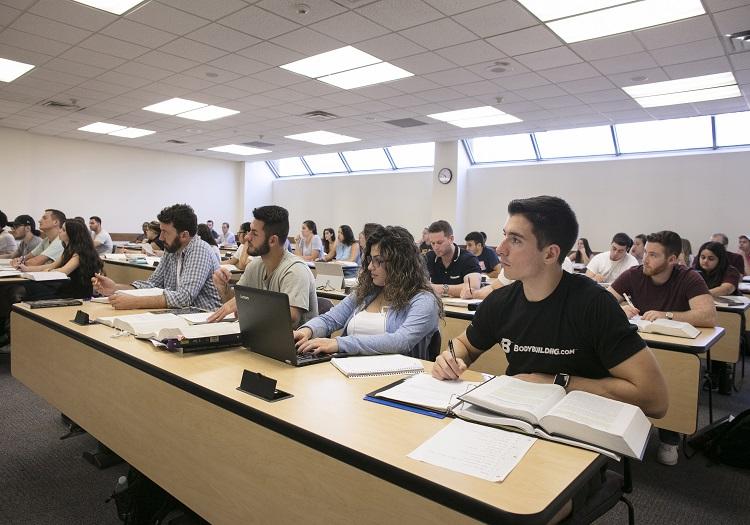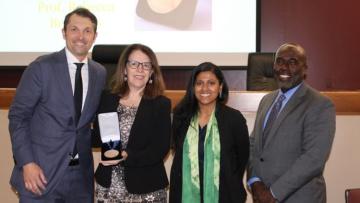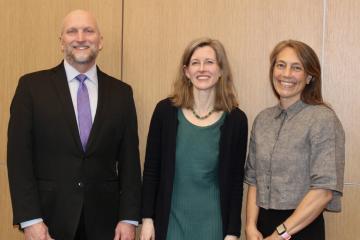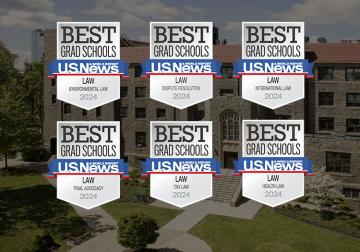Elisabeth Haub School of Law's Environmental Law Program Welcomes Six Haub Visiting Scholars

THE ELISABETH HAUB SCHOOL OF LAW’S ENVIRONMENTAL LAW PROGRAM WELCOMES SIX INTERNATIONALLY RECOGNIZED ENVIRONMENTAL LAW EXPERTS AS HAUB VISITING SCHOLARS
WHITE PLAINS, NY – Pace University’s Elisabeth Haub School of Law announces its 2019-2020 Haub Visiting Scholars, who have been awarded residencies with Haub Law’s #1 ranked environmental law program during the 2019-2020 academic year. The Visiting Scholars come to the Law School from prestigious universities across the country with diverse areas of interest and expertise in environmental law and related fields.
The 2019-2020 Haub Visiting Scholars are:
- Hope Babcock, Professor of Law and Director, Institute for Public Representation Environmental Law Clinic, Georgetown University
- Deepa Badrinarayana, Professor of Law, Chapman University
- Victor Flatt, Dwight Olds Chair in Law, University of Houston
- Blake Hudson, Professor of Law and A.L. O'Quinn Chair in Environmental Studies, University of Houston
- James May, Distinguished Professor of Law and co-Founder and co-Director, Dignity Rights Project and Environmental Rights Institute, Widener University Delaware Law School
- Richard Wallsgrove, Assistant Professor, William S. Richardson School of Law, University of Hawaii
“The Elisabeth Haub School of Law is home to the #1 ranked environmental law program in the United States,” said Dean Horace Anderson. “We are proud that these academics will enhance our environmental law program and allow our students to have a greater understanding of environmental law, policy and regulation and the intersection of these areas.”
“The Elisabeth Haub School of Law continues to welcome scholars at the top of their fields to give our students a global perspective on environmental law,” said Gilbert and Sarah Kerlin Distinguished Professor of Environmental Law and Executive Director of Environmental Law Programs Jason Czarnezki. “We look forward to welcoming the newest group of Haub Scholars to further strengthen our partnerships with environmental law programs around the world.”
“Collaboration and innovation are essential as we confront the monumental environmental challenges of the Anthropocene and train our students to do the same,” said Interim Associate Dean of Environmental Programs Katrina Fischer Kuh. “Haub Environmental Law has long been at the forefront of developments in environmental law and policy and our faculty welcome the opportunity to work closely with leading scholars from across the United States to forge progress on issues like climate change, the protection of biodiversity, and renewable energy deployment.”
Each of these experts will bring their own research and experience to the role of the Haub Visiting Scholar.
Hope Babcock is a Professor of Law and Director at the Institute for Public Representation Environmental Law Clinic at Georgetown University. She has dozens of publications, including a forthcoming one in the Syracuse Law Review on the Public Trust Doctrine. She is currently working on a piece examining President Trump's recent issuance of a presidential permit for US-Canada border facilities to enable construction of the Keystone XL Pipeline. Another longer-term project of interest to Babcock is putting together her six public trust articles in a book that examines the remarkable resilience of the doctrine in an era of over-codification of policy preferences.
“Being a Haub Visiting Scholar provides an opportunity to reflect about ideas I write about with some of my favorite colleagues in the teaching world and bright, engaged students in an atmosphere that encourages and supports environmental studies,” said Hope Babcock. “The Elisabeth Haub School of Law has some of the best environmental law professors in the country and I look forward to the chance to work more closely together.”
Deepa Badrinarayana is a Professor of Law at Chapman University, Fowler School of Law. She has dozens of publications on climate change and energy rights, and in 2018 she published her article “A Constitutional Right to International Legal Representation: The Case of Climate Change,” in Tulane Law Review, which is the basis of her ongoing research. Her current research projects focus on the right to clean energy and on climate change and human rights. She also plans to organize a workshop/conference on climate change, focusing on issues of rights and duties, and State responsibility, at Chapman University, Fowler School of Law in Spring 2020. Badrinarayana is an alumnus of the Elisabeth Haub School of Law at Pace University, having received an LLM and SJD in 2001 and 2007, respectively.
“It is singular honor to have this opportunity to return to my alma mater,” said Deepa Badrinarayana. “I am looking forward to being immersed in the Pace community, and for my projects to be enriched by interactions with students and faculty.”
Victor Flatt is currently the Dwight Olds Chair in Law and the Faculty Co-Director of the Environment, Energy, and Natural Resources Center at the University of Houston Law Center. Flatt’s major areas of research and writing have been in environmental administration and enforcement, with particular attention lately to climate change mitigation and adaptation. He has also integrated his environmental and climate work with energy issues, and has conducted extensive research into the transformation of the electricity industry.
“I am honored and excited to be selected as a Haub Visiting Scholar,” said Victor Flatt. “I am looking forward to working with the many smart and talented faculty on climate change and energy transformation. In particular, I will be working on a long term project on attorney ethics and climate change.”
Blake Hudson is a Professor of Law and A.L. O'Quinn Chair in Environmental Studies at the University of Houston. His research and writing focuses on the intersection of land use planning and natural resource management. Currently, he has a number of projects on which he is working, including a chapter for the Environmental Law Collaborative detailing some areas of land use regulation where state and local governments must become more engaged in light of climate change, an article on moral obligations and the takings clause, and an empirical article regarding the forest carbon sequestration potential of currently unforested medians along interstates around the U.S.
“The Elisabeth Haub School of Law is a preeminent leader in environmental law, held in the highest regard by every academic institution that teaches courses on the environment,” said Blake Hudson. “I am so thrilled to visit as a Haub scholar and to engage with the students and faculty of Pace. Both New York City and Houston have been hit with powerful hurricanes in the recent past. Yet each has responded in distinct ways to the land use challenges posed by climate change. I look forward to exchanging ideas with the Haub Law community about how growing, major metropolitan areas can better land use plan in a rapidly changing global environment.”
James May is a Distinguished Professor of Law and co-Founder and co-Director of the Dignity Rights Project and Environmental Rights Institute at Delaware Law School. He is also an Adjunct Professor of Graduate Engineering at Widener University, where he founded the Widener Sustainability Initiative as the University's first Chief Sustainability Officer. May is a past recipient of the Elisabeth Haub Award for Environmental Law, a former federal civil litigator, the founder of several award-winning public interest programs, and the author of seven books and more than one hundred book chapters and articles.
"During my visit as the Haub Visiting Scholar I look forward to sharing ideas with the law school's excellent faculty regarding the intersection of human rights and environmental law, focusing on constitutionally-recognized rights to human dignity," said Professor James May.
Richard Wallsgrove is an Assistant Professor at the William S. Richardson School of Law, University of Hawaii. He teaches a variety of courses, including International Environmental Law, Clean Energy Law & Policy, Business Associations, and Contracts. Prior to joining the faculty, he served as Policy Director for the Blue Planet Foundation, a Hawai‘i-based nonprofit organization focused on clean energy advocacy. His current scholarly interests span a variety of topics related to renewable energy law and policy, with a particular focus on the regulation of electric utilities and the adoption of just and sustainable utility models and initiatives.
“I am deeply honored and wonderfully excited to be selected as a Haub Visiting Scholar,” said Richard Wallsgrove. “The students and faculty in the Environmental Law program have a well-deserved reputation for excellence, and New York's status as a leader in energy policy is equally deserved. I cannot imagine a better place for learning about and discussing ideas that can help foster the clean energy revolution.”
In their roles at Haub Law, these Visiting Scholars will collaborate with faculty, guest lecture classes, and work closely with students in Haub Law's Environmental Law Program and others. As previously announced, funding for the Haub Visiting Scholars was made possible by a gift from the Haub family in recognition of the essential role of environmental science, informatics and other technology and allied fields towards formulating environmental policy and law.
The Elisabeth Haub School of Law at Pace University’s environmental law program is ranked #1 in the nation by “US News &World Report.” The Law School’s doctoral graduates teach environmental law at universities around the world. The school’s J.D. alumni are prominent in environmental law firms, agencies and non-profit organizations across the U.S. and abroad.
###
About Elisabeth Haub School of Law at Pace University
Pace University’s Elisabeth Haub School of Law, offers J.D. and Masters of Law degrees in both Environmental and International Law, as well as a Doctor of Juridical Science (SJD) in Environmental Law. The school, housed on the University’s campus in White Plains, NY, opened its doors in 1976 and has over 8,500 alumni around the world. The school maintains a unique philosophy and approach to legal education that strikes an important balance between practice and theory. For more information visit http://law.pace.edu



